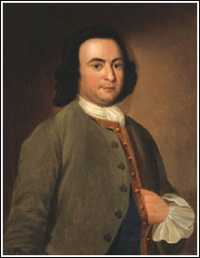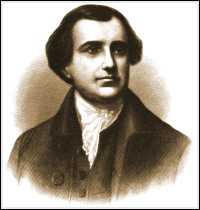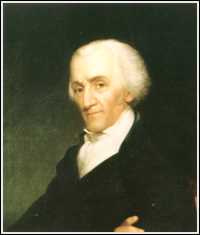 COLONEL MASON,
COLONEL MASON, Mr. RANDOLPH
Mr. RANDOLPH Mr. GERRY,
Mr. GERRY,- the duration and reeligibility of the Senate.
- the power of the House of Representatives to conceal their journals.
- the power of Congress over the places of election.
- the unlimited power of Congress over their own compensation.
- Massachusetts has not a due share of Representatives allotted to her.
- Three fifths of the Blacks are to be represented as if they were freemen.
- Under the power over commerce, monopolies may be established.
- The vice president being made head of the Senate.
- by the general power of the Legislature to make what laws they may please to call necessary and proper.
- Raise armies and money without limit.
- To establish a tribunal without juries, which will be a Star-chamber as to Civil cases.
[Mason's] Objections to This Constitution of Government
There is no Declaration of Rights, and the laws of the general Government being paramount to the laws and constitution of the several States, the Declarations of Rights in the separate States are no Security. Nor are the People secured even in the enjoyment of the benefits of the common law. In the House of Representatives, there is not the substance, but the shadow only of representation; which can never produce proper Information in the legislature, or inspire confidence in the people; the laws will therefore be generally made by men little concerned in, and unacquainted with their effects and consequences. The Senate have the power of altering all money bills, and of originating appropriations of money, and the salaries of the officers of their own appointment, in conjunction with the president of the United States; although they are not the representatives of the people, or amenable to them. These, with their other great powers, viz.: their power in the appointment of ambassadors and all public officers, in making treaties, and in trying all impeachments, their influence upon and connection with the supreme Executive from these causes, their duration of office, and their being a constant existing body, almost continually sitting, joined with their being one complete branch of the legislature will destroy any ballance in the government, and enable them to accomplish what usurpations they please upon the rights and liberties of the people. The Judiciary of the United States is so constructed and extended, as to absorb and destroy the judiciarys of the several States; thereby rendering law as tedious, intricate and expensive, and justice as unattainable, by a great part of the community, as in England, and enabling the rich to oppress and ruin the poor. The President of the United States has no Constitutional Council, a thing unknown in any safe and regular government. He will therefore be unsupported by proper information and advice; and will generally be directed by minions and favourites; or he will become a tool to the Senate --- or a Council of State will grow out of the principal officers of the great departments; the worst and most dangerous of all ingredients for such a council in a free country; From this fatal defect has arisen the improper power of the Senate in the appointment of public officers, and the alarming dependence and connection between that branch of the legislature and the supreme Executive. Hence also sprung that unnecessary officer the vice president; who for want of other employment, is made president of the Senate; thereby dangerously blending the executive and legislative powers; besides always giving to some one of the States an unnecessary and unjust pre-eminence over the others. The President of the United States has the unrestrained power of granting pardons for treason; which may be sometimes exercised to screen from punishment those whom he had secretly instigated to commit the crime, and thereby prevent a discovery of his own guilt. By declaring all treaties supreme laws of the land, the Executive and the senate have, in many cases, an exclusive power of legislation; which might have been avoided by proper distinctions with respect to treaties, and requiring the assent of the House of Representatives, where it could be done with safety. By requiring only a majority to make all commercial and navigation laws, the five Southern States, whose produce and circumstances are totally different from that of the eight Northern and Eastern States, may be ruined, for such rigid and premature regulations may be made, as will enable the merchants of the Northern and Eastern States not only to demand an exorbitant freight, but to monopolize the purchase of the commodities at their own price, for many years, to the great injury of the landed interest, and impoverishment of the people; and the danger is the greater, as the gain on one side will be in proportion to the loss on the other. Whereas requiring two-thirds of the members present in both Houses would have produced mutual moderation, promoted the general interest, and removed an insuperable objection to the adoption of this government. Under their own construction of the general clause, at the end of the enumerated powers, the Congress may grant monopolies in trade and commerce, constitute new crimes, inflict unusual and severe punishments, and extend their powers as far as they shall think proper; so that the state legislatures have no security for their powers now presumed to remain to them, or the people for their rights. There is no declaration of any kind, for preserving the liberty of the press, or the trial by jury in civil causes; nor against the danger of standing armies in time of peace. The State legislatures are restrained from laying export duties on their own produce. Both the general legislature and the State legislatures are expressly prohibited making ex post facto laws: though there never was nor can be a legislature but must and will make such laws, when necessity and the public safety require them; which will hereafter be a breach of all the constitutions in the Union, and afford precedents for other innovations. This government will set out a moderate aristocracy: it is at present impossible to foresee whether it will, in its operation, produce a monarchy, or a corrupt tyrannical aristocracy; it will most probably vibrate some years between the two, and then terminate in the one or the other. The general legislature is restrained from prohibiting the further importation of slaves for twenty odd years; though such importations render the United States weaker, more vulnerable, and less capable of defence.